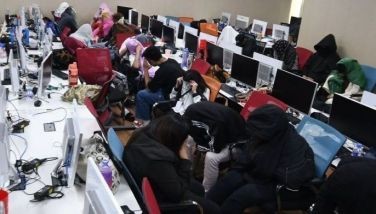YEARENDER: David vs Goliath at The Hague
MANILA, Philippines – Two years after turning to international arbitration against China’s expansionist moves in the West Philippine Sea, Manila finally got to see its case proceeding when the United Nations Arbitral Tribunal started hearing last July China’s objections to UN jurisdiction.
The Philippines is the first country to question China’s nine-dash line claim over the South China Sea and the West Philippine Sea.
Foreign Affairs Secretary Albert del Rosario told the UN Arbitral Tribunal that through a “salami-slicing” and “cabbage” strategy, China is brazenly eating into Philippine territory to consolidate its hold over disputed waters in violation of international laws.
“Outside observers have referred to this as China’s ‘salami-slicing’ strategy: that is, taking little steps over time, none of which individually is enough to provoke a crisis,” Del Rosario said.
“When these small steps are taken together, however, they reflect China’s efforts to slowly consolidate de facto control throughout the South China Sea,” Del Rosario told the tribunal.
In a legal setback for China, the Permanent Court of Arbitration (PCA) based in The Hague ruled on Oct. 29 that it has jurisdiction to hear the case filed by the Philippines.
In filing the case against Beijing, Manila also wants to reaffirm its right to exploit waters within its 200-nautical-mile exclusive economic zone (EEZ) as allowed under the United Nations Convention on the Law of the Sea (UNCLOS).
The PCA said Manila’s case was “properly constituted” under the UNCLOS and that China’s “non-appearance” or refusal to participate in the arbitration proceedings did not preclude the court’s jurisdiction over the case.
With the jurisdictional issue resolved, hearings on the merits of the case proceeded.
China has stubbornly refused to take part in the proceedings, insisting its has unquestionable sovereignty over the South China Sea based on its nine-dash line claim.
Aside from the Philippines and China, Vietnam, Taiwan, Malaysia and Brunei also have claims in the South China Sea.
Artificial islands
Apparently in a bid to strengthen its position on the issue, Beijing has been building artificial islands – complete with military facilities – over coral reefs and shoals in areas within the EEZ of the Philippines.
China’s island-building activities were brought up during oral arguments in The Hague. Del Rosario and Solicitor General Florin Hilbay led the Philippine panel in the UN court.
The Philippines concluded its legal arguments against China before the arbitral tribunal with a declaration that it is entrusting its fate to a court that it believes will uphold the rule of law and not the “quaint aspiration of a time now past.”
In a speech before the tribunal, Del Rosario said whatever is decided by the tribunal would have an impact on the fate of the Philippines, the region and the UNCLOS.
Del Rosario urged the UN arbitral tribunal not to give China the “golden key” that would allow Beijing to convert its nine-dash line in the South China Sea into a “Berlin Wall of the Sea” and a “giant fence” owned by Beijing.
“We confidently entrust our fate, the fate of the region and, indeed, the fate of the Convention to you,” del Rosario said, as he expressed confidence the court’s “capable hands” would steer the issue to “a truly just solution.”
APEC hosting
The country’s international image also got some burnishing from its successful hosting of the Asia-Pacific Economic Cooperation (APEC) Summit in November.
Success came even if the nearly P10-billion budget for the event may not have been completely used, according to Marciano Paynor Jr., chairman of the APEC 2015 National Organizing Committee.
The Department of Budget and Management said only P7.913 billion was spent over the year for the summit and other APEC meetings held throughout the year.
Russian President Vladimir Putin and Indonesian President Joko Widodo skipped the APEC Economic Leaders Meeting (AELM) in Manila on Nov. 18-19 due to domestic concerns.
In a meeting between Del Rosario and his Chinese counterpart Wang Yi on Nov. 10 at the DFA, Manila agreed not to include the South China Sea issue on the agenda, stressing that APEC was an economic gathering.
Wang said he would like to make sure the attendance of President Xi Jinping in the summit would be smooth, safe and successful.
While assuring the Chinese officials of trouble-free attendance, Philippine officials admitted the maritime dispute might be discussed among officials on bilateral basis.
“Under the shadow cast by the terrorist attacks in Paris, Beirut and against Russian aircraft over the Sinai, and elsewhere, we strongly condemn all acts, methods and practices of terrorism in all their forms and manifestations,” the leaders said in a nine-page 2015 APEC Economic Leaders’ Declaration.
The leaders cited “the urgent need for increased international cooperation and solidarity in the fight against terrorism” as they concluded the annual meeting.
“We will not allow terrorism to threaten the fundamental values that underpin our free and open economies,” the leaders said. “Economic growth, prosperity and opportunity are among the most powerful tools to address the root causes of terrorism and radicalization.”
The APEC leaders’ last major statement on terrorism was in Shanghai in 2001 after the 9/11 terrorist attacks in the United States.
The Philippines, a founding member of APEC, previously hosted the APEC Economic Leaders’ Meeting nearly two decades ago – in 1996 in Subic Bay.
EDCA
The DFA last year also had to deal with controversy sparked by the US insistence on the implementation of the Enhanced Defense Cooperation Agreement (EDCA) with the Philippines.
In November, US Ambassador Philip Goldberg said EDCA – held up for more than a year since it was signed with the Philippines – would be for the mutual interest of the US and the Philippines.
Washington is hopeful the Supreme Court would hand down a favorable decision on the defense agreement, he said.
The Philippines, he said, is set to receive a “high amount” of foreign military funding in 2016 after receiving $79 million in bilateral assistance from the US last year.
US President Barack Obama earlier promised that a big part of the $140 million in foreign military funding in the region in 2016 would go to the Philippines.
“We have upped our foreign military funding for the Philippines. It will be somewhere in the range of $79 million this year. It was originally targeted at $50 million. It’s increasing and what has been proposed is something called maritime security initiative in the region,” Goldberg said.
“Our ability to help the Philippines (is also tied to EDCA),” the ambassador said when asked if the US support to the Philippines would be affected should SC rule against it.
The homicide conviction of US Marine Joseph Scott Pemberton for the killing of Filipino transgender Jeffrey “Jennifer” Laude in October last year also put to test the diplomatic relations between the Philippines and the US.
An Olongapo court ruled on Dec. 1 that Pemberton was guilty of homicide and not murder for Laude’s death.
Pemberton was sentenced to six to 12 years imprisonment. Regional Trial Court Judge Roline Ginez-Jabalde also ordered Pemberton to pay P50,000 as civil indemnity and P4.32 million to Laude’s family as damages for loss of earning capacity.
The court noted that under the Visiting Forces Agreement (VFA) between the US and the Philippines, the confinement or detention of US personnel shall be carried out in facilities mutually agreed upon by authorities from both countries.
EU’s commitment
Despite delays in the passage of the Bangsamoro Basic Law (BBL), the European Union (EU) vowed to continue supporting Mindanao peace and development efforts, initially with 5.5 million euros or P275 million.
“The European Union is impressed by the fact that the government’s and the MILF’s commitment to the peace process despite the delay of the adoption of the Bangsamoro Basic Law has not changed,” European Union Ambassador Franz Jessen said.
“And inspired with this firm resolve to peace, the EU’s eagerness and readiness to support the calls for a negotiated political settlement in Mindanao remains,” he said.
The EU said its programs in Mindanao can be implemented with or without the BBL, noting that the commitment goes beyond the passage of the BBL.
Also last year, the DFA worked double time to address threats of the Middle East Respiratory Syndrome coronavirus (MERS-CoV) on Filipino workers.
In April, the DFA confirmed a Filipino had died in the United Arab Emirates due to MERS-CoV while five other Filipinos had been placed under quarantine.
The DFA also confirmed in March that three Filipino female healthcare personnel in Saudi Arabia had contracted MERS-CoV.
Also last year in Cebu, a crime incident took on diplomatic color as it involved a Chinese consular official and other diplomats.
The Chinese consular officer and her husband involved in the fatal shooting of two Chinese diplomats and the wounding of the consul general in Cebu City were flown to China on the night of Oct. 23 even before local police could complete their investigation.
Police turned over the custody of Li Qingliang and his wife, Guo Jing, who worked in the consulate’s visa section, to Chinese authorities.
The couple is accused of killing diplomats Sun Shan and Hui Li and wounding Consul-General Song Ronghua, who survived a bullet wound in the neck, at the Lighthouse Restaurant in Cebu.
The couple invoked diplomatic immunity after the shooting.
The DFA clarified that immunity enjoyed by Philippine and Chinese diplomats in accordance with the Vienna Convention on Consular Relations was expanded with the signing of the 2009 Consular Agreement between Manila and Beijing.
- Latest
- Trending

































